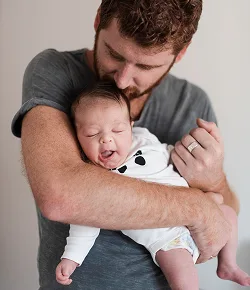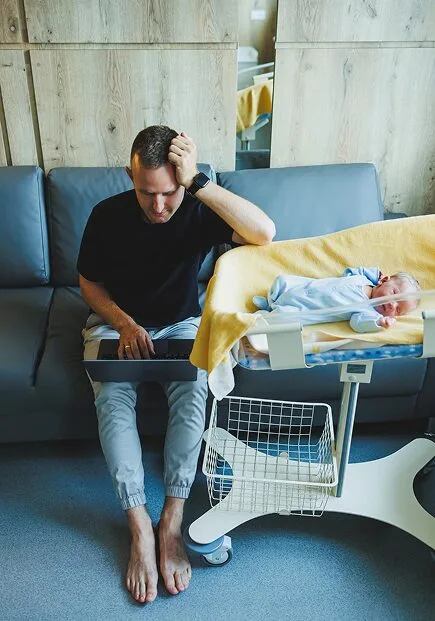Feel Like Yourself Again with Postpartum Therapy in Denver
Fatherhood can bring joy, but it can be overwhelming. At Denver Men’s Therapy, we help new dads facing postpartum depression heal, reconnect with loved ones, and create lasting connections with family.




What Having Postpartum Depression Feels Like For Men
- Persistent sadness or emptiness, even during joyful moments with your newborn.
- Increased frustration or anger, often over small things, straining relationships.
- Struggling to connect emotionally with your baby or partner, feeling detached.
- Intense guilt or shame, believing you’re failing as a partner or parent.
- Constant exhaustion beyond typical new parent fatigue, often with sleep difficulties.
- Avoiding friends, family, and even activities you once enjoyed, preferring isolation instead.
You don’t have to face it alone. Our compassionate therapists are here to help you heal and reconnect with yourself and your family.
How Often Do Men Experience Postpartum Depression?
While postpartum depression is often linked to mothers, research shows that approximately 8% to 13% of new fathers experience it within the first year after childbirth. Male postpartum depression treatment is frequently overlooked, yet the effects of the depression are just as significant.
Men may encounter intense stress from newfound responsibilities, shifts in their identity, or even hormonal changes after their partner gives birth. Unlike women, men are more likely to suppress their emotions, believing they must remain strong for their family.
However, unspoken feelings of inadequacy, anxiety, or loneliness can quietly undermine their mental health. Left unaddressed, these emotions may lead to strained relationships and difficulty bonding with their newborn.
It’s essential to acknowledge that male PPD is real and that seeking help is a sign of strength, not weakness.


What to Expect at Your First Postpartum Depression Therapy Session
Your first therapy session with a male postpartum therapist offers a safe, confidential space to share your experiences. Our therapists will listen without judgment, helping you explore your emotions and pinpoint any triggers.
Expect open-ended questions about changes in your mood, sleep patterns, and overall well-being since becoming a dad. The goal of this session is to understand your unique challenges and begin crafting a tailored plan to support your mental health.
You’ll also have a chance to discuss any concerns you might have about the therapy process. Together, we’ll build a foundation of trust, setting you on a path to recovery and a renewed emotional connection with your family.
Common Challenges Addressed in Postpartum Therapy
Fatherhood brings joy but with unexpected challenges. Many new fathers experience anxiety, depression, and mood swings. Postpartum therapy helps to address these struggles, including:
- Role Adjustment: Transitioning to fatherhood can lead to feelings of identity loss or confusion. Therapy supports men in embracing their new role with confidence and clarity.
- Relationship Pressures: Balancing responsibilities can strain relationships. Therapy helps improve communication and strengthen connections with partners.
- Fatigue and Sleep Deprivation: The demands of fatherhood can leave you drained, both physically and mentally. Therapy provides tools to manage exhaustion and prioritize restorative rest.
- Male Postpartum Depression: Therapy provides a safe environment for men to discuss their experiences and receive the support they need to overcome this challenge.
With the right support, you can overcome these challenges and feel more confident as a new dad.

Meet Our Therapists Specializing in Male Postpartum Depression
Our team includes male postpartum therapists who are highly experienced in supporting men through the complexities of postpartum depression.
With a deep understanding of male-specific challenges, we provide compassionate, non-judgmental guidance to help you reclaim your sense of self and well-being. We offer Our services include in-person therapy in Denver and online options across Colorado, ensuring accessible support wherever it’s needed.

Stephen Rodgers
LCSW, Owner, EMDR Certified
I help male survivors of childhood abuse build healthy, connected and meaningful lives.

JUSTIN FRIEL
LMFT | EMDR Trained
I work with LGBTQ+ people struggling with issues relating to sex, spirituality, and relationships – helping them to navigate a journey of healing and growth toward wholeness.

The Effects of Ignoring Male Postpartum Depression
Ignoring male postpartum depression treatment doesn’t just affect you—it can ripple through your entire family. Here are some potential consequences:
- Strained Relationships: Unaddressed symptoms can lead to increased conflict and emotional distance with your partner.
- Poor Bonding with Baby: Emotional detachment may hinder forming a strong bond with your newborn, impacting their development.
- Increased Risk of Substance Use: Some may turn to alcohol or drugs as a coping mechanism for unresolved emotional pain.
- Mental Health Deterioration: Suppressing symptoms can escalate into severe, long-term depression or anxiety.
- Impact on Child’s Development: Children benefit from engaged fathers; untreated PPD can impair your child’s emotional and social growth.
Seeking help isn’t just for you—it’s a step toward building a stronger, healthier foundation for your entire family.
Why Seeking Counseling for Postpartum Depression Is Important
Male postpartum therapy is vital for both your mental health and your family’s well-being, however it’s often overlooked. Our specialized male postpartum therapists in Denver understand the unique challenges it poses, and provide the support you deserve.
Male PPD often manifests as irritability, disengagement, or feelings of hopelessness, which can harm family dynamics and your newborn’s development. Children thrive when they have active, emotionally present fathers.
Addressing these symptoms can help you reconnect with your family, nurture your bond with your newborn, and reclaim your sense of self. Don’t let untreated PPD hold you back from being the dad you aspire to be.


Our Therapeutic Approaches to Postpartum Depression for Dads
At Denver Men’s Therapy, we offer specialized approaches to support fathers struggling with postpartum depression. Our therapies include:
- EMDR (Eye Movement Desensitization and Reprocessing): Targets traumatic or stressful memories, helping to reduce emotional distress and improve mental clarity.
- Ketamine-Assisted Psychotherapy: Utilizes ketamine in a controlled therapeutic setting to alleviate severe depressive symptoms and promote emotional breakthroughs.
- Dialectical Behavioral Therapy (DBT): Teaches practical skills to manage intense emotions, improve communication, and enhance overall emotional resilience.
These approaches are designed to empower fathers, helping them heal and reconnect with their loved ones during this challenging phase of parenthood.
Your Questions About Male Postpartum Therapy, Answered
1. How does a father's depression affect a newborn child and family?
A father’s depression can lead to emotional distance, strained relationships, and reduced bonding with the newborn. This can impact the child’s emotional development and create a stressful home environment.
2. Can men have postpartum depression?
Yes, men can experience postpartum depression. It often manifests as irritability, withdrawal, or anxiety and is just as real and impactful as postpartum depression in mothers.
3. How long does male postpartum depression last?
Male postpartum depression can last from a few weeks to several months. Without treatment, it can persist for longer, affecting both the individual and family dynamics.
4. Can male postpartum depression go away on its own?
While it’s possible, male postpartum depression often requires professional support to resolve fully. Ignoring symptoms can prolong the condition and worsen its impact.
5. What causes postpartum depression in men?
Common causes include hormonal changes, sleep deprivation, financial stress, new responsibilities, and a lack of support. The sudden life changes can trigger anxiety and depressive symptoms.
6. When should I seek help for male postpartum depression?
Seek help if symptoms like persistent sadness, irritability, or detachment last longer than two weeks, especially if they interfere with daily life or bonding with the baby.
7. How can I support a partner who is experiencing postpartum depression?
Offer emotional support, encourage open conversations, and help them seek professional counseling. Be patient, understanding, and involved in the parenting journey.
8. Is postpartum depression different for fathers than for mothers?
Yes, it can differ. Fathers often experience symptoms like increased irritability, anger, or emotional withdrawal, whereas mothers may show more classic signs like sadness or tearfulness. These differences can affect how each parent interacts with their child and partner during the postpartum period.
Take Control of Your Postpartum Health








